40% of podcast listeners use an in-app search bar to discover new podcasts. The trend is clear: if you want more reach, you need to optimize your podcast for search.
One way to get there is with podcast SEO. Think of it as invisible levers you can pull to boost your ranking and drive more traffic to your podcast.
In this post, we'll cover how to optimize your podcast for Spotify, YouTube, and search — plus uncover how to find great topics for your next episode.
Table of Contents
How to Optimize a Podcast for Spotify
How to Optimize a Podcast for YouTube
How to Optimize a Podcast for Search
How to Find Topics for a Podcast
How to Optimize a Podcast for Spotify
Update your show page.
Every podcast on Spotify has a show page. You can think of it as a landing page for your podcast.
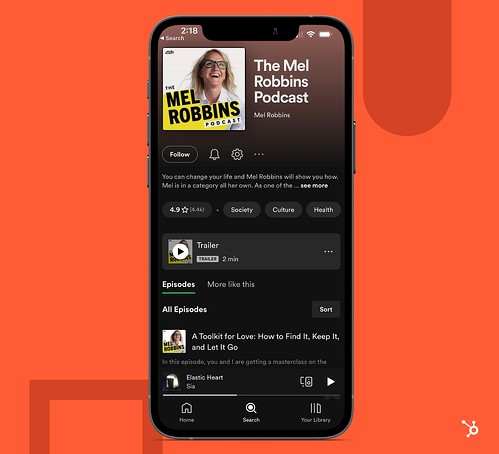 According to Spotify, the purpose of a show page is to give listeners everything they need to know about your podcast, including:
According to Spotify, the purpose of a show page is to give listeners everything they need to know about your podcast, including:
- Its title
- Its cover art
- Its show description
- A "Follow" button
- A list of recently published episodes
The show page isn't something to rush through — or leave to collect dust. Ensure each element is up-to-date, accurate, and as compelling as possible.
Include sub-topics in your show description.
Show descriptions are typically short and concise, so you need to make every word count. To get an SEO boost, incorporate phrases or sub-topics that match what your potential audience is searching for.
For instance, the health and wellness podcast Maintenance Phase includes sub-topics like "health fads," "wellness scams," and "nutrition advice" in its description. These are search teams that could lead someone to the podcast. 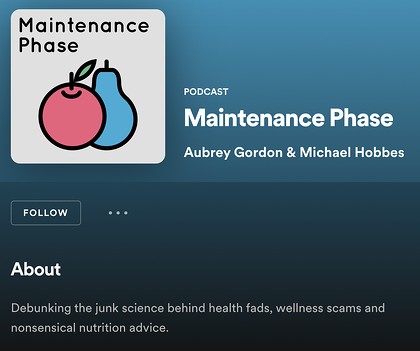
Front-load key information in your episode description.
Writing an episode description is another way to optimize your podcast, but many skip it. This space offers keyword opportunities, meaning you can rank individual episodes in search.
Spotify recommends using the first 20 words of your description to hook new listeners. Don't repeat information in your episode title or general podcast description. Instead, jump right into the episode's topic or guest.
How to Optimize a Podcast for YouTube
Add video chapters.
A few years ago, Google began surfacing YouTube content in search results. For instance, a quick Google search of "How to have a breakthrough" populates a list of relevant videos — including a video chapter from the Tony Robbins Podcast:
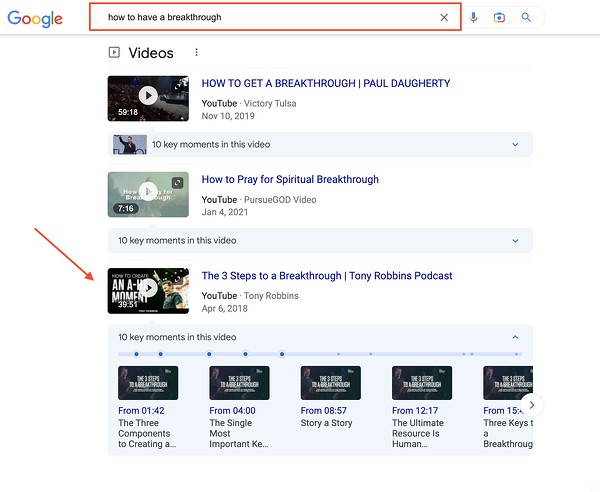
To show up in search results, start by dividing your podcast into different sections, also known as video chapters. This creates a structure for Google to understand your video.
It's not enough to add video chapters — you also need to optimize them. The key is adding relevant keywords in the title of each chapter.
In the video below, the primary keyword is "email marketing," but, by leveraging video chapters, it also targets the keywords email list and email segmentation.
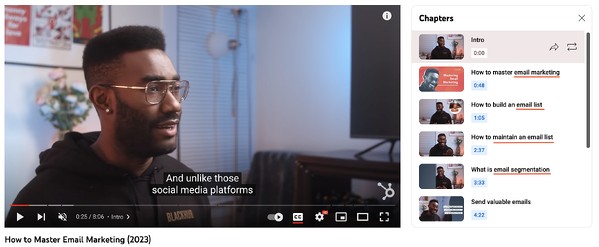
Besides the search benefits, video chapters also improve user experience. For instance, have you ever skimmed an entire video to find a particular conversation or topic? By adding chapters to your podcast, viewers have a roadmap to skip to the topics that most interest them.
Create playlists.
If your podcast covers a range of topics, consider creating a playlist for each topic. Why? YouTube populates playlists in its search results, giving your content another chance to be seen.
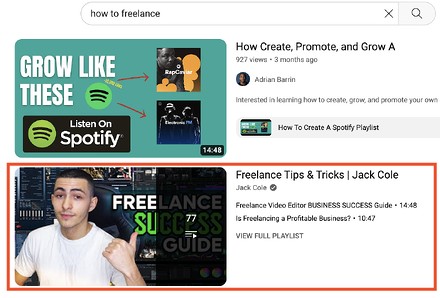
Playlists can also organize your podcast library and send viewers down a content rabbit hole, encouraging them to spend more time watching related videos.
For example, the Jay Shetty Podcast has a number of playlists on its YouTube channel, including health tips, money habits, and relationship advice. If you're interested in one of these topics, you could spend hours listening to a single playlist.
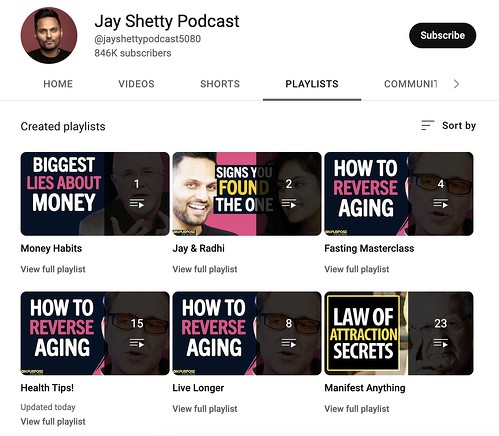
Add the target keyword to your video's file name, title, and description.
Before hitting "Publish" on your next YouTube video, make sure the following areas are optimized:
- The file name. You should first mention your primary keyword in the video's file name. Here's why: YouTube can't actually "watch" your video to see how relevant it is, but it can read your video's file name, which is one (of many) context clues.
- Video title: When possible, naturally incorporate your target keyword in the video title. On top of that, keep your title clear, compelling, and short (aim for 60 characters or less).
- Video description. Front-load your video description with the most crucial information — such as a keyword-rich summary, crucial links, or a CTA. Keep in mind that YouTube only displays the first two or three sentences before viewers have to click "Show more" to see the entire description.
Now let's take a look at how to optimize your podcast for search.
How to Optimize a Podcast for Search
Plan your episodes around specific keywords.
Keywords are the name of the game when it comes to podcast SEO. After all, the number one way people discover new podcasts is via the search bar.
By planning your episodes around keywords, you can put your show (or individual episodes) in front of users who have specific intents.
For instance, if you have an entrepreneurial podcast like The Side Hustle Show, you might target keywords like "side hustle," "print on demand," and "affiliate marketing."
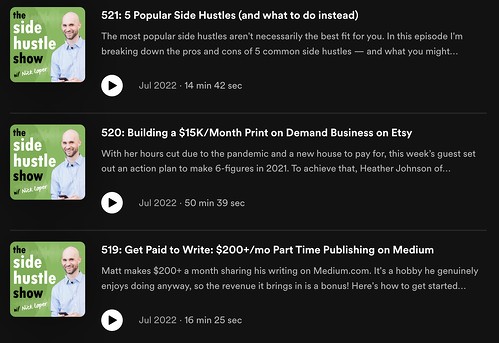
Always include written content for Google to index.
Never skip out on writing a title or description for each podcast episode. Yes, it's time-consuming, but it gives Google something to "read" and understand in more detail.
It's also a good idea to add a transcript to your podcast. While Google's text-to-speech capabilities are improving, it's not always accurate.
By adding your own transcript — either manually or automatically — Google can better understand the content of your episodes. Plus, with the right topic, keywords, and keyword placement, you can boost your podcast's discoverability and ranking.
Create a website for your podcast.
While this isn't necessary — especially when you're just starting out — having a dedicated website for your podcast has SEO benefits. A website offers more real estate for keywords and gives search engines more information about your podcast beyond just the title and description.
You can also create blog content that compliments your podcast. This is a great way to cross-promote across multiple channels and build a bigger following in the process.
How to Find Topics for a Podcast
Whether you're just starting a podcast or have been in the game for years, it's essential to find good topics to talk about.
Podcasts cover a range of subject matters. Here are the three main types:
- Trending topics — these are topics that receive higher-than-average attention and engagement on social media.
- Evergreen topics — these are topics with consistent search demand and interest.
- Interviews — these are topics that relate to an interviewee and/or their area of expertise.
How to Find Trending Topics
The best way to find trending topics is by checking what words, phrases, or stories are trending on social media. Twitter is a great place to start.
You can also leverage keyword research tools such as Google Trends, Moz, and Semrush to spot trending keywords and gauge the popularity of certain topics.
How to Find Evergreen Topics
Here, the goal is to find topics that are tailored to your audience and achieve a particular purpose. For instance, you might be a real estate investor looking to offer advice to new professionals in the field.
This requires doing a deep dive into your audience. What are their interests? Needs? Pain points? These questions are key when finding evergreen content.
In addition, use a keyword research tool (like the ones listed above) to find topics relating to your niche, industry, or expertise. Always check to see if demand is consistent or fluctuates throughout the year.
Back to You
As the popularity of podcasts continues to surge, so does the need to optimize them for maximum reach. Following the tips above, you can ensure your podcast content is properly optimized for search engines.

